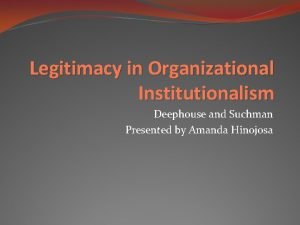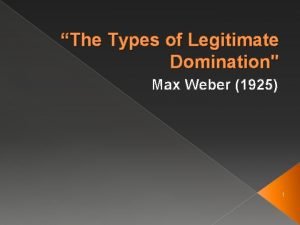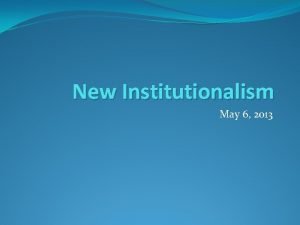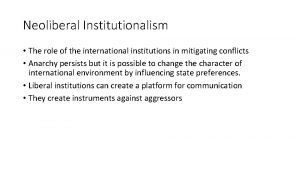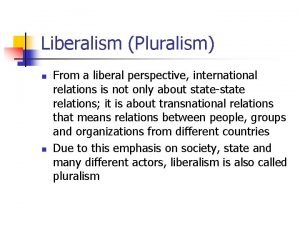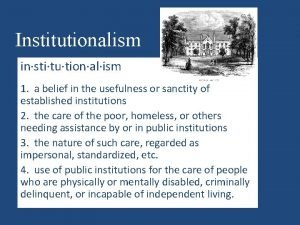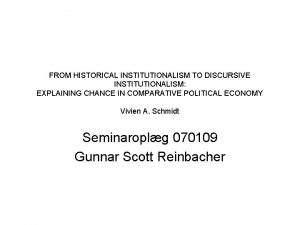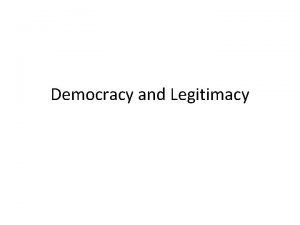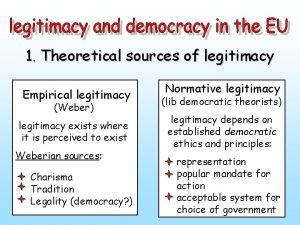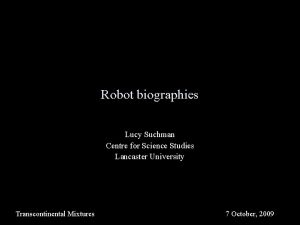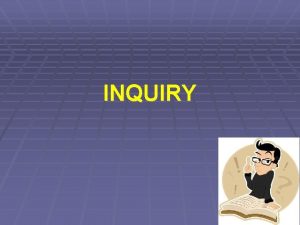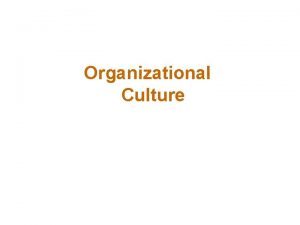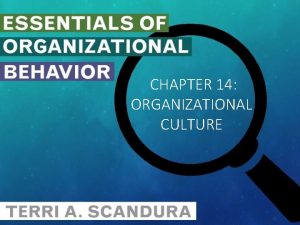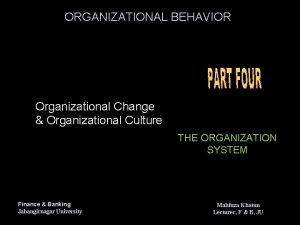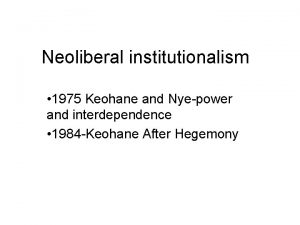Legitimacy in Organizational Institutionalism Deephouse and Suchman Presented




















- Slides: 20

Legitimacy in Organizational Institutionalism Deephouse and Suchman Presented by Amanda Hinojosa

Evolution of Legitimacy �Beginnings: Weber �legitimacy of authority types �New institutional theory �Meyer and Rowan (1977) � Legitimacy results from being efficient and from conforming to institutionalized myths in the organizational environment. � Legitimacy insulates the organization from external pressures �Zucker (1977)

Definitions of Legitimacy �Meyer and Scott (1983) �The degree of cultural support for an organization �Pfeffer and Salancik (1978) �Legitimacy is known more readily when it is absent than when it is present. �Knoke (1985) �The acceptance by the general public and the relevant elite organizations of an association’s right to exist and to pursue its affairs in its chosen manner.

Legitimacy: Gains and Losses �Galaskiewicz (1985)- Organizations seek to gain legitimacy �Ashforth and Gibbs (1990)-Purposes of legitmation efforts: �Gaining �Maintaining �Defending �Elsbach (1994), Elsbach and Suttion (1992)

The turning point-1995 �“Legitimacy is not a commodity to be possessed or exchanged but a condition reflecting cultural alignment, normative support, or consonance with relevant rules or laws” (Scott 1995: 45) �“Legitimacy is a generalized perception or assumption that the actions of an entity are desirable, proper, or appropriate within some socially constructed system of norms, values, beliefs and defintions” (Suchman 1995: 574)

Normative legitimacy �Normative legitimacy IS NOT Normative isomorphism �Normative legitimacy- congruence with general social values �Normative isomorphism-congruence with eithics and worldviews of formal professions

Professional vs. Normative �Normative legitimacy IS NOT Normative isomorphism �Professional legitimacy-legitimacy conferred by professional endorsement (on any grounds) �Normative legitimacy- legitimacy conferred by any audience (including but not limited to professionals)

Measuring ‘taken-for-grantedness’? �Absence of questioning—problem is research asks questions, which then violates the taken-forgrantedness �Archival- Number of media articles (greater numbers=more legitimacy �Problems (i. e. car industry) �If completely taken for granted… �Any brilliant ideas from the class?

Subjects of legitimation �Almost anything! �BUT beware of aggregating lower-level subjects of legitimacy to assess legitimacy of higher-level subjects

Sources of legitimacy �Who has collective authority over legitimation in any given setting? �Depends on focus of research question �Society at large, specific legitimacy-granting authorities, media, interorganizational relations �What type of research questions would warrant looking at each of the possible sources of legitimacy?

Sources of Legitimacy �Common sources of legitimacy are often also organizations �Legitimate sources of legitimacy? �Legitimate to some may be illegitimate to others �What problems does this introduce into research questions about legitimacy? �Absence of legitimacy challenges a good way to measure legitimacy?

Legitimation processes �Need for research on the order in which different sources confer legitimacy and the different dimensions of legitimacy are conferred. �Ideas on possibilities?

Antecedents of Legitimacy �Technical efficiency, conformity to institutional myths (Meyer and Rowan 1977) �Tested by Deephouse (1996)—legitimacy to one audience may not mean legitimacy to another �Suchman-Organizations may also gain legitimacy by manipulating rather than conforming to environments �Use of text to gain legitimacy

Consequences of Legitimacy �Enhances organization survival �Strategic view of legitimacy�Legitimacy can be manipulated to achieve organizational goals �Legitimacy affects competition for resources �Various types of legitimacy can affect other performance measures

Legitimacy, status and reputation �Status: socially constructed, intersubjectively agreedupon and accepted ordering or ranking of social actors (Washington & Zajac, 2005)…based o n esteem or deference �Reputation: is a generalized expectation about a firm’s future behavior or performance based on collective percepetions of past behavior on performance (Ferguson, Deephouse, & Ferguson, 2000)

Your thoughts? �Why should we look at legitimacy? �What questions are best answered by looking at legitimacy (as opposed to looking at status or reputation)? �How do you think legitimation, reputationbuilding and status-seeking intersect and overlap?

Legitimacy Source-Conformity to social guidelines Visibility and Credibility Presumption of propriety Criterion for status-group membership Status Evaluation by Legitimation sources Standing and mobility Source-Ascription and Group Mobility Reputation Source-Achievement and self-presentation Increased returns to performance

Discussion �Legitimacy and its dimensions are analytic concepts (not fully separable empirical phenomena) �Investigate the sources of legitimacy, and legitimacy at multiple levels of analysis �Draw on work of other disciplines to improve understanding of organizational legitimacy

New research suggestions �Births and deaths of legitimating sources �Legitimation at multiple levels �Within organizations �Among organizations �Within organizational fields

OT questions �Why do organizations exist? �Why are firms the same/different? �What causes changes in organizations? �Why do some firms survive and others don’t? �What are the emerging issues?
 Legitimacy in organizational institutionalism
Legitimacy in organizational institutionalism Weber domination
Weber domination The types of legitimate domination
The types of legitimate domination Legitimacy ap gov definition
Legitimacy ap gov definition Historical institutionalism
Historical institutionalism Historical institutionalism
Historical institutionalism Neo liberal institutionalism
Neo liberal institutionalism Assumption of liberalism
Assumption of liberalism Historical institutionalism
Historical institutionalism Historical institutionalism
Historical institutionalism Historical institutionalism
Historical institutionalism Institutionalism acrostic
Institutionalism acrostic Edward a. suchman
Edward a. suchman Kaedah pengajaran edup3033
Kaedah pengajaran edup3033 Edward suchman stages of illness
Edward suchman stages of illness Setting quotes jekyll and hyde
Setting quotes jekyll and hyde Love and hate in romeo and juliet
Love and hate in romeo and juliet Ozymandias narrator
Ozymandias narrator Ozymandias and london venn diagram
Ozymandias and london venn diagram Cause and effect text example
Cause and effect text example Banner in newspaper
Banner in newspaper
